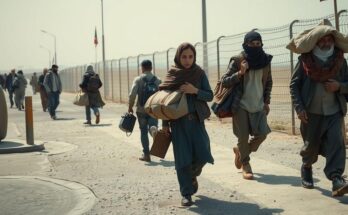South Sudan faces renewed threats of civil war following the arrest of opposition leader Riek Machar, which jeopardizes a fragile peace agreement. The country’s ethnic divisions and recent violence underscore the urgent need for international intervention to stabilize the region and address humanitarian crises.
South Sudan, the world’s youngest nation, is on the brink of another civil war, following the potential collapse of a peace agreement that once ended extreme violence in the area. The country gained independence from Sudan in 2011 amid extensive pro-independence movements but has faced ongoing challenges in maintaining order among its ethnically divided populace, leading to civil wars in 2013 and again in 2016, finally quelled by a ceasefire in 2018.
In the current turmoil, President Salva Kiir’s government, which includes opposition leader Riek Machar, is fraught with tension. Machar’s recent arrest has raised alarms, as the SPLM/A-IO party he leads declared that this act effectively dismantled the peace agreement between him and Kiir. The SPLM/A-IO stressed that the situation poses grave consequences for peace and stability within the nation.
Machar’s arrest followed the detainment of other key SPLM/A-IO officials and an influx of Ugandan troops to assist the South Sudanese military against local militias. The SPLM/A-IO criticized this intervention as an instance of “military aggression against civilians” and indicated that it could violate the peace accord’s terms.
The nation, which has yet to conduct a national election since its independence, is sharply divided along tribal lines between Kiir’s Dinka faction and Machar’s Nuer group. Recent violent confrontations in Nasir have exacerbated the unrest, leading to numerous casualties among the local populace.
Authorities accused Machar of inciting rebellion through his connections with the militia involved in violence against government forces, contradicting the SPLM/A-IO’s denial of such affiliations. Information Minister Michael Makuei stated that there would be an investigation concerning Machar and his factions, suggesting intentions to halt their influence.
Internationally, there is increasing concern regarding the state of affairs in South Sudan. UN officials have expressed fears that the situation moves the country closer to civil war, urging a return to calm and adherence to the peace agreement. Several Western nations have called for Machar’s release and an immediate ceasefire, while warnings have been issued for foreign nationals to exit the country.
The African Union has pledged to send a delegation to assist in de-escalating tensions, and regional leaders, such as Kenya’s president, are actively seeking solutions to prevent further conflict.
Ultimately, the World Bank has highlighted severe humanitarian issues exacerbated by ongoing violence and economic mismanagement, noting that a significant portion of the population lives in dire poverty. The UN has reiterated that South Sudan is dangerously close to a collapse into deeper crisis, stressing the necessity for global attention to this precarious situation.
In summary, South Sudan’s fragile peace is threatened by political turmoil and increasing violence, highlighted by the arrest of opposition leader Riek Machar. With deep-rooted ethnic divisions, the risk of returning to civil war looms large, prompting international calls for adherence to the peace agreement and immediate de-escalation efforts. The humanitarian situation remains dire, with the nation classified as being on the brink of catastrophe if swift actions are not taken.
Original Source: www.cnn.com




